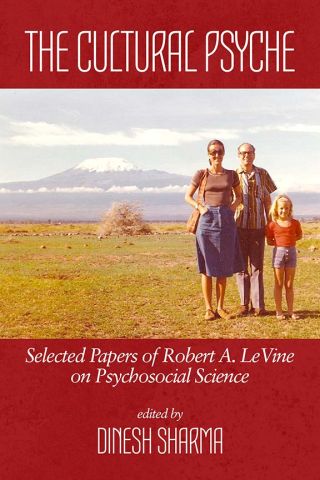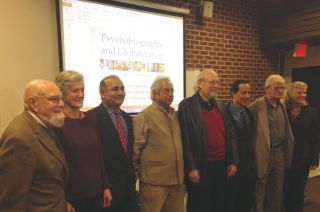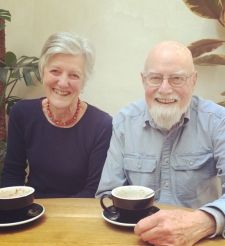Cross-Cultural Psychology
Robert LeVine: A Founder of Psychological Anthropology
A cultural explorer of the psyche who researched childhood around the globe.
Updated October 3, 2023 Reviewed by Michelle Quirk
Key points
- Culture and psyche are intertwined throughout the lifecycle.
- Anthropology and psychology are inextricably linked to human development.
- Interdisciplinary studies are growing in an interconnected world.
Robert Alan LeVine (1932–2023) was one of the founders or an early advocate of psychological anthropology, a social science discipline at the intersection of socio-cultural anthropology, psychology, psychoanalysis, developmental science, and global studies. He was born in Brooklyn (March 27, 1932), grew up in Manhattan, and after the age of 9 years lived in Englewood, New Jersey, in a middle-class Jewish family. His parents Emily and Aaron LeVine were distinctly left in politics, his father was a sometimes Trotskyist, and his maternal grandfather was anti-religious, so he neither studied Hebrew nor had a Bar Mitzvah.
In an autobiographical essay, in the edited collection of essays, The Cultural Psyche (2021), he wrote, “I knew no intellectuals or academics. But I was a studious child, known to classmates in elementary school as “The Professor.”

Bob LeVine’s interest in cross-cultural research began early in junior high school. As a young student at Englewood Public Library, he came across pictures of exotic cultures in National Geographic magazine and wondered if Freud’s theories would apply to people around the world. This was in the 1940s when Abraham Kardiner was teaching at Columbia University, and Franz Boas’s cadre of eminent students including Margeret Mead, Edward Sapir, Ruth Benedict, and Zora Neale Hurston held sway in American anthropology. For Bob LeVine, this began a life-long interest in “culture and personality” studies.
LeVine was a classically trained anthropologist, who had studied with David Riesman, Robert Redfield, and Fred Eggan at the University of Chicago for his B.A. (1951) and M.A. degrees (1953). Since the University of Chicago didn’t have any psychological anthropologists at the time, he was determined to go to Harvard University to study with Clyde Kluckhohn, one of the founders of the Department of Social Relations, and later with John and Beatrice Whiting, founders of the Laboratory of Human Development at the Harvard Graduate School of Education. He received a Ph.D. in social anthropology from Harvard University in 1958.
Bob LeVine was truly a polymath in interdisciplinary studies. As Byron Good (2021) at Harvard University has stated, “Bob has spent his career speaking to very different communities—psychological and cultural anthropologists, Africanists, psychoanalysts, developmental psychologists, personality theorists, policy makers interested in the effects of maternal education on children and on social and economic development."
He taught briefly at Northwestern University (1958–1960), and then at the University of Chicago (1960–1976) and Harvard University (1976–1998), where he was Emeritus as the Roy E. Larsen Professor of Education and Human Development. He wrote and edited 15 books and published more than 125 peer-reviewed articles and book chapters. He was best known for his integration of psychoanalysis and anthropology in the landmark book, Culture, Behavior and Personality (1974), and more recently for studies of parenting across cultures, Do Parents Matter, written for a popular audience with Sarah E. LeVine (1940–2023), his life-partner and research collaborator for more than 55 years. She was a clinical social worker and later earned a doctoral degree in Sanskrit studies, religion, and anthropology (2001), but worked as a research associate and ethnographer on all of their cross-cultural studies of child-rearing and parenting ranging from various African nations, Mexico, Nepal, Germany, and Italy to Venezuela.

Bob LeVine was an empiricist who believed in positivism and ethnographic fieldwork throughout his career and didn’t fall prey to academic trends that questioned the fundamentals of social science research methods. He had collaborated with Don Campbell, who developed the quasi-experimental design methods of fieldwork, on studies of ethnocentrism (1972). Many of LeVine’s students were familiar with the dictum, "if there is a trend in the data, it will show up in the fieldwork" with clear-eyed observations. The best antidote for dogma, and for LeVine this included even "the Freudian dogmas," was empirical observations. For example, he advocated for the revisionist view that Freud’s theory was not universally applicable, and had to be culturally sensitive to different childhood conditions and family contexts around the world, including the Oedipus complex, the shibboleth of psychoanalysis.
As envisioned by Bob LeVine in his book Human Conditions (LeVine and White, 1986), the human development indicators have improved in many societies as income, health care, and educational opportunities have been expanded. The cultural basis of educational development as a key driver has led to a significant decline in extreme poverty and an increase in working-class and middle-class families around the world in emerging economies throughout Africa and Asia.
In the beginning, Bob was one of the few social scientists in the United States who conducted field research into different cultures, with an explicitly psychological, psychodynamic or psychoanalytic, and developmental framework. Later on, he branched into global studies of parenting in different cultures, and influenced by Harvard colleagues Catherine Snow and Jeane Chall, he conducted research on literacy and mothering in collaboration with his wife Sarah LeVine, Literacy and Mothering (2012).

Historically, the professional convergence of "culture" and "psychology" as a discipline was by no means a fait accompli. Yet, over the past half-century, there are signs of a rapprochement, in part due to the work of psychological anthropologists, and the rise of "cultural psychology" and "cross-cultural psychology." The divisions that define disciplinary boundaries between psychologists and anthropologists are in many ways as tradition-bound today as they were at the turn of the 20th century. Here, Bob LeVine’s project of a psychosocial science, integrating the two disciplines in terms of their history, methods, and research, offers the best way forward to unite culture and psyche at the heart of our everyday experience.
As psychologists embrace the larger human laboratory in real-world field settings, locating the psyche in culture has the real possibilities of advancing the discipline of psychology from within and without. On the one hand, greater emphasis on "subjectivity in anthropology" will lead to newer lines of inquiry that advance what Bob LeVine called person-centered ethnography, while the greater emphasis on the brain, neuroscience, and genomics might fuel studies on epigenetics, plasticity, and human growth and maturation in cultural context, or what LeVine has termed the “biocultural” or “biopsychosocial” model of human development.
In carrying forward the interdisciplinary social science tradition, Bob LeVine has offered an essential cross-cultural perspective on human development and psychology. He has insisted psychologists and all behavioral or social scientists take into account the human conditions of people from around the world. He has designed studies that have been conducted in diverse social contexts. He has trained a wide range of students from Africa, India, Central and South America, and Europe as well as the United States.
As explorers of the human psyche and culture, his students have fostered an interdisciplinary method of research that is indispensable to social sciences. Finally, his decades-long studies on the effect of education on parental goals and behaviors, incorporating anthropology, psychology, economics, demography, language or area studies, and population analysis will serve as a model for cross-cultural study for many generations, especially, as we have entered the information age with increased digitization and online methods of education and knowledge transfer.
References
Dinesh Sharma, ed. The Cultural Psyche: The Selected Papers of Robert A. LeVine on Psychosocial Science. Information Age Publishing. 2021.
Robert A. LeVine, Sarah LeVine. Do Parents Matter?: Why Japanese Babies Sleep Soundly, Mexican Siblings Don't Fight, and American Families Should Just Relax. PublicAffairs. 2017.
Robert A. LeVine, Merry I. White. Human Conditions: The Cultural Basis of Educational Development. Routledge Kegan and Paul. 1986.
Obituary: Robert and Sarah LaVine. The Boston Globe.




